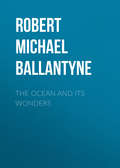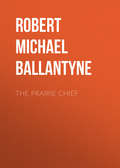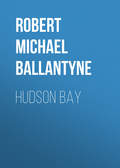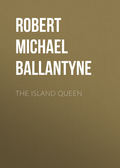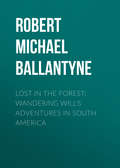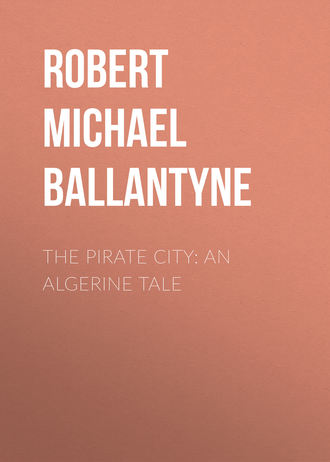
Robert Michael Ballantyne
The Pirate City: An Algerine Tale
Chapter Ten.
Shows what Lessons were taught in the Bagnio, and describes a Brave Dash for Freedom
Bacri, the chief of the Jews, proved as good as his word.
By means of a golden lever he moved some one, who moved some one else, who moved the Dey to make certain inquiries about the slaves in the Bagnio, which resulted in his making the discovery that Lucien Rimini was a first-rate linguist and an excellent scribe.
Immediately he was commanded to fill the office of scrivano to the Dey—that post being vacant in consequence of the previous secretary having given his master some offence, for which he had had his head cut off.
But Lucien’s elevation did not necessarily improve the condition of his father and brother. The Dey cared only for those slaves who made themselves useful to him; their relations he utterly ignored, unless they succeeded in gaining his regard. The Sicilians had too much common-sense to expect any great immediate advantage from the change, nevertheless, the slight hope which had been aroused by this event enabled the two who were left in the Bagnio to endure their lot with greater fortitude and resignation. As for Lucien, he resolved to win the Dey’s esteem in order to be able to influence him in favour of his father and brother.
“We must learn to submit, my son,” said Francisco, one evening, while he and Mariano were finishing the last crumbs of the black bread which constituted their morning and evening meals.
“I admit it, father,” said Mariano, with a long-drawn sigh. “Bacri was right; but it’s not easy to bear. For myself, I think I could stand their insults and their lash better if they would only spare you, but when I see the villains strike you as they did to-day—oh, father!”—Mariano flushed and clenched his hands—“it makes me so wild that I feel as though the blood would burst my veins. You cannot wonder that I find it impossible to submit.”
“God bless you, boy,” said Francisco, laying his hand on the youth’s shoulder; “I understand your feelings—nevertheless it were well that you learned to restrain them, for rebellion only works evil. You saw what was the consequence of your attacking the man who struck me to-day—you got knocked down and bastinadoed, and I—”
Francisco paused.
“Yes, go on, father, I know what you mean.”
“Well, I would not hurt your feelings by mentioning it—as you say, you know what I mean.”
“You mean,” said Mariano, “that in consequence of my violence they gave you an additional flogging. True, father, true; and that is the one thing that will now enable me to suffer in silence.”
At this point in the conversation they were interrupted by a deep groan from a young man in the cell opposite, which was prolonged into an appalling cry.
Most of the slaves in the foul den had finished their meagre meal and lain down on the hard floors to seek, in heavy slumber, the repose which was essential to fit them for the toils of the coming day.
Some of them awoke and raised themselves on their elbows, but sank back again on seeing that nothing particular had occurred. A few who had been rendered callous by their sufferings did not take the trouble to move, but Francisco and Mariano rose and hastened to the man, supposing him to have fallen into a fit. Mariano moved with difficulty owing to the chains, upwards of sixty pounds weight, which he wore as a punishment for his recent violence.
“Go—go back to your rest,” said the man, who lay with clenched teeth and hands, as Francisco kneeled beside him, “there is nothing the matter with me.”
“Nay, friend, you are mistaken,” said Francisco, taking his hand kindly; “your look, and that perspiration on your brow, tell me that something is the matter with you. Let me call our jailer, and—”
“Call our jailer!” exclaimed the young man, with a fierce laugh; “d’you think that he’d take any notice of a sick slave? No, when we get sick we are driven out to work till we get well. If we don’t get well, we are left to die.”
“Surely, surely not!” said Francisco.
“Surely not!” repeated the young man. “Look; look there!”
He pointed as he spoke to the old man who lay on his back at full length in the recess next to his own.
“See. He is a free man now! I knew he was to be released to-night. I have seen many and many a one set free thus since I came here.”
Francisco was horrified, on going to the place where the old man lay, to find that he was dead. He had observed him tottering and looking very feeble at his work in the stone-quarries that day, but in his own misery had forgotten him since returning to the Bagnio.
“Too true!” he said, returning to the young man; “his troubles are indeed ended; but tell me what is it that ails thyself.”
“’Tis memory,” said the young man, raising himself on his elbow, and gazing sadly into Francisco’s face. “Your conversation to-night for a moment aroused memories which I have long sought to stifle.—Lad,” he said, laying a hand impressively on Mariano’s arm, “take the advice that Bacri gave you. I was once as you are. I came here—years ago—with a father like thine; but he was an older and a feebler man. Like you, I fought against our fate with the ferocity of a wild beast, and they tortured me until my life hung by a thread, for I could not endure to see the old man beaten. As you said just now, ‘you cannot wonder that I found it impossible to submit,’ but they taught me to submit. Oh! they are clever devils in their cruelty. They saw that I cared not for my life, but they also saw that I suffered through my father, and at last when I became rebellious they beat him. That tamed me, and taught me submission. The old one who lies there was a friend and comrade in sorrow of the dear father who was set free a year ago. I lay thinking of them both to-night, and when I saw you two taking the first steps on the weary path which I have trod so long—and have now, methinks, well-nigh finished—I could not restrain myself. But go—get all the rest you can. We cannot afford to waste the hours in talk. Only be sure, lad, that you take the Jew’s advice—submit.”
Without replying, the father and son crept back to their hard couch. Had they been in more comfortable circumstances their thoughts might have caused them to toss in feverish restlessness, but sheer muscular exhaustion, acting on healthy frames, caused them to fall at once into a deep slumber, from which they were rudely aroused next morning at four o’clock to proceed to the Marina, where they were to be engaged that day on certain repairs connected with the bulwarks of the harbour.
On the way down they were joined by an old man in a semi-clerical costume, whose gentle demeanour appeared to modify even the cruel nature of their savage guards, for they ceased to crack their whips at his approach, and treated him with marked respect.
Some of the slaves appeared to brighten into new creatures on beholding him, and spoke to him in earnest tones, addressing him as Padre Giovanni.
The padre had a consoling word for all, and appeared to be well acquainted with the various languages in which they spoke.
Approaching Francisco and his son he walked beside them.
“Thou hast arrived but recently, methinks?” he said in a tone of commiseration, “and hast suffered much already.”
“Ay, we have suffered somewhat,” replied Francisco in an off-hand tone, not feeling much inclined to be communicative just then.
In a few minutes, however, Giovanni had ingratiated himself with the Sicilians to such an extent that they had related all their sad history to him, and already began to feel as if he were an old friend, before they had traversed the half-mile that lay between their nightly prison and the harbour.
Arrived at their place of toil—the artificial neck connecting the little light-house island with the mainland,—Mariano was ordered to convey large masses of stone for the supply of a gang of slaves who were building a new face to the breakwater, while his father was harnessed, with another gang, to the cart that conveyed the stones to their destination along a temporary tramway.
The severity of the labour consisted chiefly in the intense heat under which it was performed, and in the unremitting nature of it. It must not be imagined, however, that there was not a single touch of humanity in the breasts of the cruel slave-drivers. Hard task-masters though they undoubtedly were, some of them were wont to turn aside and look another way when any of the poor slaves sat down for a few minutes, overcome with exhaustion.
There was little opportunity allowed, however, for intercourse among the unfortunates. One or two who, judging from their faces, showed sympathetic leanings towards each other, were immediately observed and separated. This had the effect of hardening some, while it drove others to despair.
One of those whose spirit seemed to vacillate between despair and ferocity was the young man already referred to as being an inhabitant of Francisco’s part of the Bagnio. He was a Portuguese, named Castello. In carrying the stones to and fro, he and Mariano had to pass each other regularly every three or four minutes. The latter observed, after a time, that Castello glanced at him with peculiar intelligence. At first he was puzzled, but on next passing him he determined to give him a similar look. He did so. Next time that Castello passed he said, in a low tone, without looking up, and without in the least checking his pace—
“Better to die than this!”
Mariano was taken by surprise, and at first made no reply, for he recalled the man’s advice of the previous night, but, on passing the Portuguese again, he said, in the same low tone—
“Yes, much better!”
Curious to know what was meant by this—for the tones and glances of Castello were emphatic—Mariano kept on the alert as he repassed his comrade, expecting more. He was not disappointed, though the nature of the communication tended to increase his surprise.
“Fall and hurt yourself,” whispered Castello, and passed on.
Much perplexed, Mariano tried to conceive some reason for such a strange order, but failed. He was, however, one of those rare spirits who have the capacity, in certain circumstances, to sink themselves—not blindly, but intelligently—and place implicit confidence in others. Hastily reviewing the pros and cons while laying his stone on the breakwater, and feeling assured that no great harm could possibly come of compliance, he gave a nod to his comrade in passing.
“I want to speak to you,” muttered Castello briefly.
At once the reason flashed on Mariano’s mind. The delay consequent on the fall would afford opportunity for a few more sentences than it was possible to utter in passing.
On returning, therefore, with a huge stone on his shoulder, just as he passed his friend he fell with an admirable crash, and lay stunned on the ground.
Castello instantly kneeled by his side and raised his head.
“Ten of us,” he said quickly, “intend to make a dash for the Bab-el-Oued gate on the way back to-night: join us. It’s neck or nothing.”
“I will, if my father agrees,” said Mariano, still lying with closed eyes—unconscious!
“If he does, pull your hat on one side of your head as you—” A tremendous lash from a whip cut short the sentence, and caused Castello to spring up. “Rise, you dog!” cried the Turk who had bestowed it; “are Christians so delicate that they need to be nursed for every fall?”
Castello hurried back to his work without a word of reply, and Mariano, opportunely recovering, with a view to avoid a similar cut, staggered on with his stone; but the Turk quickened his movements by a sharp flip on the shoulder, which cut a hole in his shirt, and left a bright mark on his skin.
For one moment the gush of the old fierce spirit almost overcame the poor youth, but sudden reflection and certain tender sensations about the soles of his feet came to his aid, in time to prevent a catastrophe.
When the slaves were collecting together that evening on the breakwater, Mariano managed to get alongside of his father, who at first was very unwilling to run the risk proposed.
“It’s not that I’m afraid o’ my neck, lad,” said the bluff merchant, “but I fear there is no chance for us, and they might visit their wrath on poor Lucien.”
“No fear, father; I am convinced that the Dey has already found out his value. Besides, if we escape we shall be able to raise funds to ransom him.”
Francisco shook his head.
“And what,” said he, “are we to do when we get clear out of the Bab-el-Oued gate, supposing we are so far lucky?”
“Scatter, and make for the head of Frais Vallon,” whispered Castello as he passed. “A boat waits at Barbarossa’s Tower. Our signal is—”
Here the Portuguese gave a peculiar whistle, which was too low to be heard by the guards, who were busy marshalling the gang.
“You’ll agree, father?” urged Mariano, entreatingly.
The merchant replied by a stern “Yes” as the gang was ordered to move on.
Mariano instantly gave his straw hat a tremendous pull to one side, and walked along with a glow of enthusiasm in his countenance. One of the guards, noting this, stepped forward and walked beside him.
“So much the better,” thought Mariano; “there will be no time lost when we grapple.”
Traversing the passages of the mole, the gang passed into the town, and commenced to thread those narrow streets which, to the present day, spread in a labyrinth between the port and Bab-el-Oued.
As they passed through one of those streets which, being less frequented than most of the others, was unusually quiet, a low hiss was heard.
At the moment Mariano chanced to be passing an open doorway which led, by a flight of stairs, into a dark cellar. Without an instant’s hesitation he tripped up his guard and hurled him headlong into the cellar, where, to judge from the sounds, he fell among crockery and tin pans. At the same moment, Francisco hit a guard beside him such a blow on the chest with his fist, as laid him quite helpless on the ground.
The other ten, who had been selected and let into the intended plot by Castello on account of their superior physical powers, succeeded in knocking down the guards in their immediate neighbourhood, and then all of them dashed with headlong speed along the winding street.
There were one or two passengers and a few small shops in the street, but the thing had been done so suddenly and with so little noise, that the passengers and owners of the shops were not aware of what had occurred until they beheld the twelve captives rush past them like a torrent—each seizing, as he passed, a broom-handle, or any piece of timber that might form a handy weapon.
Of course the other guards, and such of the maltreated ones as retained consciousness, shouted loudly, but they did not dare to give chase, lest the other slaves should take it into their heads to follow their comrades. Poor creatures! most of them were incapable of making such an effort, and the few who might have joined had they known of the plot, saw that it was too late, and remained still.
Thus it happened that the fugitives reached the northern gate of the city before the alarm had been conveyed thither.
The sun had just set, and the warders were about to close the gates for the night, when the desperadoes, bursting suddenly round the corner of a neighbouring lane, bounded in perfect silence through the archway.
The sentinel on duty was for a few moments bereft of the power of action. Recovering himself, he discharged his musket, and gave the alarm. The whole guard turned out at once and gave chase, but the few moments lost by them had been well used by the fugitives; besides, Despair, Terror, and Hope are powerful stimulators. After running a short time together up the steep ascent of the Frais Vallon, or Fresh Valley, they scattered, according to arrangement, and each man shifted for himself—with the single exception of Mariano, who would not leave his father.
Seeing this, the Turks also scattered, but in this condition they began to waver—all the more that the short twilight of those regions was rapidly deepening into night. They reflected that the guarding of their gate was a prior duty to the hunting down of runaway slaves, and, one by one, dropped off, each supposing that the others would, no doubt, go on, so that the officer of the guard soon found himself alone with only one of his men.
Having observed that two of the fugitives kept together, these Turks resolved to keep them in view. This was not difficult, for they were both young and active, while Francisco was middle-aged and rather heavy.
“Stay a moment, boy,” cried the bluff padrone, as they tolled up the rather steep ascent of the valley.
Mariano stopped.
“Come on, father; they are overhauling us.”
“I know it, boy,” said Francisco, taking Mariano by the shoulders and kissing his forehead. “Go thou; run! It is all over with me. God bless thee, my son.”
“Father,” said the youth impressively, grasping a mass of timber which he had wrenched from a shop front in passing, “if you love me, keep moving on, I will stop these two, or—Farewell!”
Without waiting for a reply, the youth rushed impetuously down the hill, and was soon engaged in combat with the two Turks.
“Foolish boy!” muttered Francisco, hastening after him.
Mariano made short work of the soldier, hitting him such a blow on the turban that he fell as if he had been struck by a sledge-hammer. Unfortunately the blow also split up the piece of timber, and broke it short off at his hands. He was therefore at the mercy of the young officer, who, seeing the approach of Francisco, rushed swiftly at his foe, whirling a keen scimitar over his head.
Mariano’s great activity enabled him to avoid the first cut, and he was about to make a desperate attempt to close, when a large stone whizzed past his ear and hit his adversary full on the chest, sending him over on his back.
“Well aimed, father!” exclaimed Mariano, as the two turned and continued the ascent of the valley.
At its head Frais Vallon narrows into a rugged gorge, and is finally lost in the summit of the hills lying to the northward of Algiers. Here the panting pair arrived in half-an-hour, and here they found that all their comrades had arrived before them.
“Friends,” said Castello, who was tacitly regarded as the leader of the party, “we have got thus far in safety, thank God! We must now make haste to Pointe Pescade. It lies about three or four miles along the shore. There a negro friend of mine has a boat in readiness. He told me of it only an hour before I spoke to you to-night. If we reach it and get off to sea, we may escape; if not, we can but die! Follow me.”
Without waiting for a reply, Castello ran swiftly along a foot-path that crossed over the hills, and soon led his party down towards that wild and rocky part of the coast on which stand the ruins of a fort, said to have been the stronghold of the famous pirate Barbarossa in days of old.
Chapter Eleven.
Is Diplomatic and Otherwise
Just after the escape of the slaves, as already narrated, the British consul demanded a private audience of the Dey. His request was granted, and one morning early he set off on horseback to the city. Arriving there too soon, he put up his horse, and, threading his way through the streets of the old town, soon found himself in front of the small and unpretending, though massive, portal of Bacri the Jew.
He found the master of the house seated in the central court, or skiffa, drinking coffee with his wife and children.
“Bacri,” said the Colonel, “may I venture to interrupt your present agreeable occupation? I wish to have a talk with you in private.”
“With pleasure,” replied the Jew, rising and ushering his visitor into a small apartment, the peculiar arrangement and contents of which betokened it the wealthy merchant’s study or office,—indeed, it might have been styled either with equal propriety, for Bacri, besides being an able man of business, was learned in Arabic literature—of which the town possessed, and still possesses, a valuable library,—and was a diligent student of the Hebrew Scriptures.
“You are aware,” said the Colonel, “that I am, at your request, about to use my influence with the Dey in behalf of certain friends of yours. Now, there is an old saying—and I have great respect for many old sayings,—that ‘one good turn deserves another.’ May I, then, ask you to do me a favour?”
“Certainly,” said the Jew. “Name it.”
“You must know, then, that the Dey has been pleased to send me a pretty Portuguese girl as a slave, along with her infant child.”
“I know it,” said Bacri.
“You do? Well, this poor girl turns out to be a very sweet creature, and my wife, although somewhat annoyed at first by the unexpected gift, and puzzled what to do with her, is now so fond of her, and finds her so gentle as well as useful, that she has set her heart on having Paulina Ruffini—that is her name—freed and sent home. This, however, is not the point. Paulina has a sister named—”
“Angela Diego,” interrupted the Jew.
“Oh! you know that too?” said the Colonel, with some surprise. “You seem to know everything that goes on in this curious city! Indeed, it is a belief in this general knowledge of yours that brings me here. Well, poor Paulina is naturally in great anxiety about her sister’s fate, not having heard of her since the day they were cruelly separated by Sidi Hassan. The latter is now my janissary, and tells me that he sold Angela to a Jew in the public market, and does not know where she is. Believing that you can find this out for me, I have come hither this morning on my way to the palace. Do you think you can?”
“I think I can,” said the Jew, opening a door and beckoning to some one without. “Come hither, Angela. A gentleman wishes to see you.”
“What! is this Paulina’s sister?” said the consul in surprise, as a pretty bright-eyed girl obeyed the summons.
“Speak, fair one,” said the Jew. “Dost know of one Paulina Ruffini, and her infant Angelina?”
We need scarcely add that Angela admitted, with a look of surprise, that she did, and was overwhelmed with joy on finding that her sister was a happy inmate of the consul’s villa, and that in a short time she would be permitted to see her.
Leaving the Jew’s house, well satisfied with his unlooked-for success in this matter, the consul proceeded to the palace, and was at once admitted into the audience-chamber.
According to custom, the Dey was seated on a sort of throne, with the huge lion-pup serving as a footstool. We have said before that this lion had a decided antipathy to the British consul. Not being able to speak, it could not give the reason why! Perhaps, although unable to speak, it might have been able to understand what was said, and, possibly, had taken offence at the straightforward manner in which the consul had more than once remonstrated with the Dey for allowing so old a pup to be at large. Be this as it may, certain it is that, on the present occasion, the lion raised its head when the consul was announced. On seeing his hated scarlet uniform, it uttered a savage growl, sprang up, and ran out of the room by another door, with its tail between its legs. In springing up, the brute had forgotten its temporary character of footstool. The result was that the Dey was tilted violently backwards, and fell off his throne in a confused and most undignified heap!
Fortunately for the lion—perchance also for the consul—Achmet possessed too much native dignity and common-sense to allow such an accident to ruffle his temper. He rose and resumed his seat with a hearty laugh, as he said—
“You see, Monsieur le Consul, that even lions are afraid of the English uniform!”
“Your highness is pleased to be complimentary,” replied the consul, with a bow; “and that emboldens me to observe that a Dey should not retain the services of one who is capable of showing fear.”
“Perhaps you are right,” returned Achmet, with a smile; “especially one who has had the audacity to dethrone me.—And now, what demand have you to make of me to-day? Not, I trust, that old one—the liberation of slaves!”
“No, not exactly that,” replied the consul. “Nevertheless,” he added earnestly, “I do come to make an appeal in behalf of slaves.”
The Dey’s countenance became grave.
“I refer,” continued the consul, “to those unfortunate slaves who recently attempted to escape, and are now lying in chains condemned to be bastinadoed, thrown on the hooks, and otherwise tortured to death.”
“How!” exclaimed the Dey, frowning darkly, while a flush of anger covered his face, “can you plead for slaves who have not only rebelled and fled, but who have disabled two of my janissaries, and some of whom—especially their leader Castello and the young Sicilian Mariano—are so turbulent as to be an absolute nuisance to their guards?”
“Your highness is aware,” answered the consul respectfully, “that British ideas in regard to slavery and all connected with it are widely different from those entertained by Algerines, and I do not presume to pass an opinion on the sentences pronounced on men who are held guilty of having violated your laws. I merely plead that you will extend to them the royal prerogative of mercy—especially to two of their number, Francisco and Mariano.”
“On what ground do you ask mercy for these?” demanded Achmet sternly.
“On the ground that courageous and worthy men, although tempted to rebel in order to regain their liberty, are not deserving of death; that the Portuguese girl your Highness was so generous as to send me, and who was captured along with them, has interested me deeply in their history, and also on the ground that one is the father and the other the brother of your scrivano Lucien Rimini.”
“Indeed!” exclaimed the Dey in surprise, “Lucien never told me that, although his own hand made out the order for their execution!”
“That,” answered the consul, with a smile, “is because I advised him to leave the pleading of their cause to me.”
“Believing, no doubt,” returned the Dey, with a laugh, “that your powers of persuasion are superior to his. Well, Monsieur le Consul, you may be right; nevertheless, let me tell you that short though the time be in which Lucien has been my scrivano, there is that in his modest air and ready will, as well as his talent, which constitutes a sufficient plea to induce me to pardon his relations.”
“It rejoices me,” said the consul, “to find that, as I expected, your highness’s—”
“Yes, yes; say no more on that head,” interrupted the Dey. “Here! Lucien,” he added, calling aloud to his secretary, who, clad in superb Oriental costume, appeared at the door which led into his office, “make out an order to cancel the sentence against your father and brother, and let them be sent to the palace immediately. I will speak with thee again on the matter.—Meanwhile, will Monsieur le Consul come and behold the present which I am preparing for my royal master the Sublime Porte?”
There was a touch of sarcasm in the tone in which he used the words “royal master,” which the consul understood well enough, for he was aware that although nominally subject to Turkey, Algiers was to all intents and purposes an independent power, and that the present referred to was almost all the benefit derived by the Sultan from his piratical vassal.
It was costly enough, no doubt, viewed simply in the light of a gift, and afforded a subject of great interest to the consul when permitted to survey it—an honour, by the way, which the Dey would not have conferred on the consul of any of the other nations represented at the Algerine court, for the British consul at that time was, as we have said, a special favourite. It consisted of two magnificent milk-white Arab horses, richly caparisoned; their saddles and bridles being profusely ornamented with diamonds and other gems, and their shoes being made of pure gold; several boxes of rare and costly jewels; six women-slaves with skins of the most beautiful ebony tint; a number of black-maned lions, several parrots, and a few monkeys.
“Your highness is resolved to please the Sultan by means of variety,” observed the consul, with a smile, after commenting on the gift in detail.
“That,” replied Achmet, “would have little power to please if the jewels were not numerous and costly. But happily our treasury can afford it, although we have not been very successful in war of late.”
He looked at the consul with a sly smile as he spoke, but the latter deemed it wise to be lost in admiration of some of the jewels in question.
After examining the “present,” the consul retired, and Achmet went to his private apartments to enjoy a cup of coffee and a pipe.
The room in which he sat was similar to that already described as being the reception-room of the bridal party, only the decorations were if possible more elaborate and sumptuous. Here, seated on rich cushions, with, not his most beautiful, but his wisest wife beside him, Achmet—once a petty officer of janissaries—gave himself up to the enjoyment of the hour. Christian slaves—once the happy butterflies of European and other lands—attended on him, filled his pipe, brought him hot coffee, and watched his every movement. They were richly dressed, more richly and gaily, perchance, than they had ever been in the days of freedom, when they had been wont to chat and laugh with careless hilarity. But they were mute enough now. A few of them had tasted the bastinado and been tamed; most of them had been wise enough to tame themselves. If Shakespeare had been a Turk he would probably have written a very different version of the Taming of the Shrew!
When coffee was finished, the Dey ordered the attendants to withdraw, and then settling himself comfortably on the cushions, and puffing two white streams of smoke slowly through his nose, in order to gather the fullest enjoyment therefrom, he thus addressed himself to his better-proportion—we had almost said “half,” but forgot for the moment that there were several Sultanas!
“Ashweesha, thou art a wise woman. I might almost style thee my guardian angel, for not only hast thou often guided me on the right road, but sometimes thou hast prevented me from straying into the wrong.”



